Cancer Treatment of Tomorrow, Today
Published Date
Article Content
This story is from the 2024 issue of Discoveries, a UC San Diego Health Sciences magazine.
Approximately six years ago, I anxiously sat in a doctor’s office at UC San Diego Health. I had been diagnosed with breast cancer at age 39 with two young kids. This was not part of my life plan, but I have learned that cancer does not discriminate and does not care about plans.
It was my first visit with my medical oncologist. While the team was amazing, I felt completely overwhelmed. It was a lot of information to process. After learning I qualified for a clinical trial, it did not take me long to decide I wanted to enroll. Having access to trials and novel treatments was the reason I chose to get my care at our region’s only academic medical center. I wanted to do whatever it took to see my kids grow up.
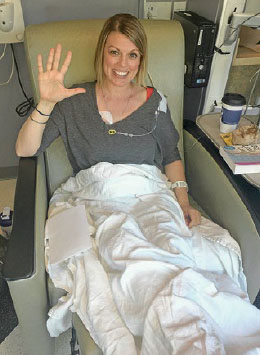
The clinical trials coordinator assigned to my case became an integral extended family member. He not only explained the trial in terms I understood, he also answered every question, and listened to and supported me during my darkest days.
My breast cancer had spread to my lymph nodes. Nearly three weeks after being on the clinical trial drug, my enlarged lymph node was normal size, and my tumor was two-thirds smaller. I had what I desperately yearned for when this ugly disease disrupted my life — hope of survival.
According to the American Cancer Society, approximately 2 million people will be diagnosed with cancer in the United States this year, with half of all men and a third of all women diagnosed during their lifetime.
Each will face life-saving decisions about treatment combined with a broad range of emotions. Cancer requires treating the whole person, not just the disease.
Studies have shown that receiving treatment at a top-ranked academic center improves survival rates.
As a National Cancer Institute (NCI)-designated Comprehensive Cancer Center, Moores Cancer Center at UC San Diego Health holds the highest possible rating for a cancer center in the nation. This designation is reserved for centers with experts in every medical subspecialty who are pushing boundaries to improve approaches for preventing, diagnosing and treating cancers.
The cancer center unites research laboratories, clinical trials, prevention and outreach programs and clinical care. The focus is on the discovery and testing of new therapies, as well as a strong emphasis on translational oncology, drug development, community outreach, rehabilitation services, and support and counseling services for patients and their loved ones.
“With more than $73 million in annual research grants and national experts in cancer care, Moores Cancer Center is not only an asset to the university, it’s an asset to our community,” said John Carethers, MD, vice chancellor for Health Sciences at UC San Diego.
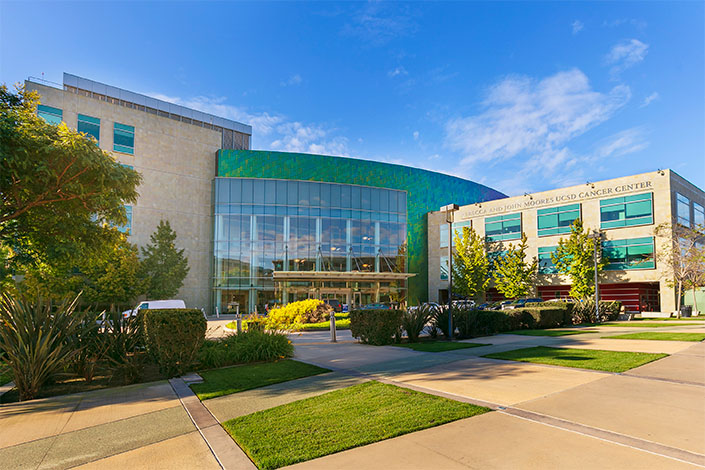
In the 2023-2024 U.S. News & World Report “Best Hospitals” survey, cancer services at UC San Diego Health ranked No. 20 in the nation.
Approximately 25,000 patients are treated for cancer at UC San Diego Health annually. Patients have access to physicians who provide personalized care and are setting treatment standards nationwide for more than 200 types of cancer. Patients also have access to clinical trials, with a dedicated team that supports more than 250 open research studies.
“Our outstanding teams have an unwavering focus on delivering lifesaving, highly specialized cancer care and groundbreaking research to the community,” said Patty Maysent, CEO of UC San Diego Health. “We are deeply proud of our cancer center and the care and compassion we provide for our patients, who are parents, family members, friends, neighbors, colleagues, and caregivers.”
The Secret Sauce
“ Moores Cancer Center is not only an asset to the university, it’s an asset to our community.”
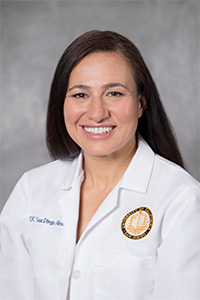
“There are many exciting diagnostic tests, biomarker assays, and therapeutic treatments being developed in the cancer world,” said Rana McKay, MD, interim associate director of clinical sciences and associate professor in the Department of Medicine at UC San Diego School of Medicine. “Our patients have access to the potential treatments of tomorrow, today.”
Immunotherapy is an area of cancer research that has continued to show tremendous promise by harnessing the body’s own immune system to treat cancer. It has been proven to be transformative in the treatment of Hodgkin lymphoma and cancers of the lungs, bladder, kidney, skin, prostate, colon, cervix, uterus, and head and neck.
Physicians are examining alternate treatment strategies to further improve outcomes while reducing treatment-related side effects, including monoclonal antibodies and antibody-drug conjugates, which are like a precision-guided “biological missile” with the ability to destroy cancer cells accurately and prevent damage to healthy cells.
These novel therapies are sometimes developed in concordance with biological indicators, called biomarkers, to inform treatment efficacy or response.
“Cancer is not one size fits all. No two cancers are alike, just as no two people are alike. Our teams are fueled by the motivation to continually understand disease states and treatment options,” said McKay, genitourinary medical oncologist at UC San Diego Health.
“What sets us apart in the region is that we design the research studies and bring the treatments directly to our patients. Integrating clinical trials into a patient’s treatment plan is critical to providing comprehensive care that has the greatest potential to positively impact long-term outcomes for patients.”
McKay added that a recent patient with prostate cancer was able to live a quality life for a decade longer after receiving 13 lines of therapy in multiple trials.
“He had many additional years of making memories with his family given the personalized care he received at UC San Diego Health,” said McKay. “We cannot cure every patient, but we work tirelessly to advance the science and treatments. We are always looking for the best option for remission and a quality of life for our patients.”
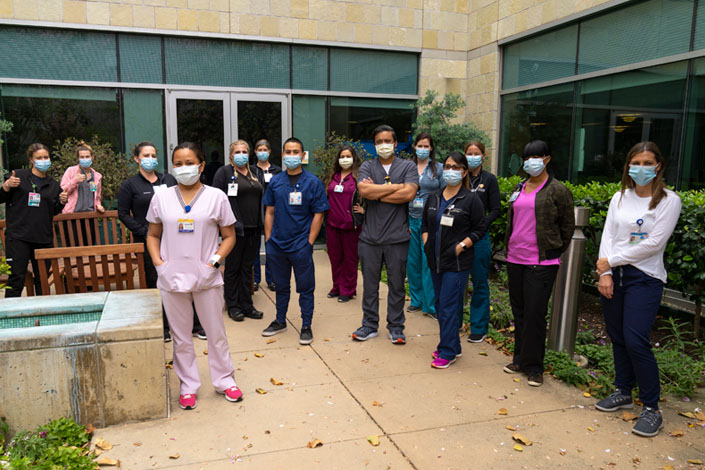
Our team is the first organization in the country to be recognized as a Center of Excellence in medication-use safety and pharmacy practice by the American Society of Health-System Pharmacists. This reflects our high-performing pharmacy department's commitment to superior patient care.
Moores Cancer Center at UC San Diego Health also utilizes a leading-edge Molecular Tumor Board. It includes expert physicians, world-class scientists, medical oncologists, surgeons, radiation therapists, geneticists, and pathologists. The team meets to discuss and advise on the best treatment plans for specific cancer patients, whose tumors have been analyzed with advanced genomic diagnostic tests.
Treatment options may include chemotherapy, radiation, surgery, blood and bone marrow transplant, cryotherapy, hormone therapy, heated intraperitoneal chemoperfusion (HIPEC), precision medicine, photodynamic therapy and/or clinical trials participation. A patient’s care plan may include one or a combination of these treatments.
The Molecular Tumor Board, working with the Center for Personalized Cancer Therapy, enables medical teams to translate science in real-time into treatment recommendations for patients.
“The advances that have been made over the last decade in the treatment of gynecologic cancers are transformative and a testament to the work being done at UC San Diego Health.”
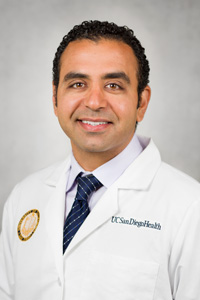
Ramez Eskander, MD
“Four walls do not make a unique cancer center. It’s when a patient walks through our doors and knows they have access to a comprehensive team with an understanding of their specific cancer, as well as a commitment to personalized therapy, including clinical trials — that is the secret sauce,” said Ramez Eskander, MD, assistant professor in the Department of Obstetrics, Gynecology, and Reproductive Sciences at UC San Diego School of Medicine and gynecologic oncologist at UC San Diego Health.
Eskander was initially interested in orthopedic surgery as a medical student, but soon gravitated towards the complexities and science behind cancer care as he approached his clinical years.
“I had the opportunity to care for patients with aggressive gynecologic cancers, observing the impact of multidisciplinary, complex care and state-of-the-art treatment. I immediately knew that was my passion, and I pursued a career in gynecologic oncology. It is an honor to build relationships with our patients from the moment of diagnosis and throughout their entire therapeutic journey,” said Eskander.
“I am incredibly passionate about what we are doing at Moores Cancer Center. Cancer has become a dynamic and rapidly evolving field. We have progressed from grouping cancers together based on organ of origin to being much more thoughtful about the molecular drivers that inform treatment. The advances that have been achieved over the last decade in the treatment of gynecologic cancers are transformative, and a testament to the work being done at UC San Diego Health.”
Kathryn Gold, MD, professor of medicine in the Department of Medicine at UC San Diego School of Medicine and interim chief of the division of hematology and oncology said cancer care and clinical trials have significantly advanced in her 15-year career, especially with targeted therapy and immunotherapy.
She added that clinical trials were once viewed as a last effort if standard treatment was not effective. Today, newer, more personalized therapies have revolutionized the way medical teams approach cancer treatment.
“We sometimes use trial drugs as first-line therapy. For some patients, a single drug may be successful; in others, we may need to add an additional therapy or try a different one,” said Gold, a lung and head and neck medical oncologist at UC San Diego Health.
“For example, lung cancer isn’t just a single disease. Every lung cancer is different, and treatment works best when it is personalized. You can think about it as lung cancer is made up of 25 different diseases with 25 possible treatment options. We now have a larger tool kit to target the specific disease for that individual.”
Brilliant, Bright Futures Ahead
Moores Cancer Center at UC San Diego Health has a remarkable legacy in San Diego and nationwide.
With the growth and volume of patients coming to UC San Diego Health for cancer care, there is an institutional commitment and investment for the community, according to McKay.
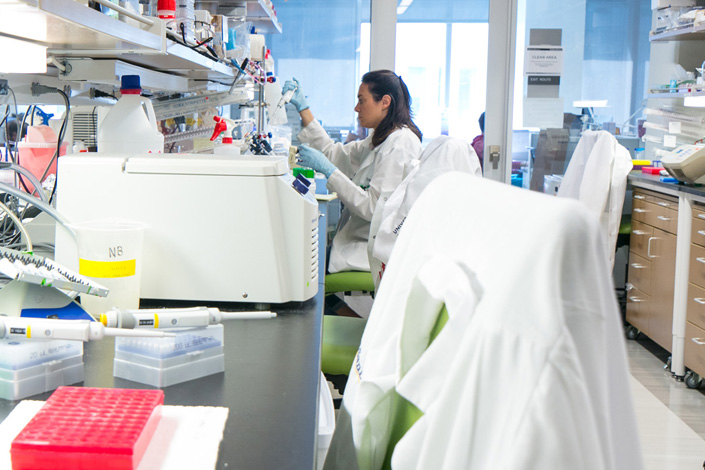
The Clinical Trials Office is redesigning its infrastructure and clinical trials operations to offer more trials to more patients, including underrepresented patients.
“Woven into the fabric of our culture of care is our diverse patient population and ensuring all patients have access to treatments and clinical trials. Health care equity is a central part of our mission. There are multiple factors in caring for our diverse patient populations, from our diverse staff to our operations,” said McKay.
“Our patients want to be seen and heard and relate to those who are providing their care during a vulnerable time.”
UC San Diego Health continues to expand and improve access to patients with cancer care locations throughout San Diego County. As part of its 10-year vision, the health system is in the process of revitalizing its medical center campus in Hillcrest where a new outpatient pavilion is scheduled to open in 2025 (see page 20). It will offer a variety of services, including advanced imaging, infusion and radiation oncology.
Other exciting efforts include the launch of translational working groups through the Moores Cancer Center Office of Translational Science to expand impactful translational research across the institution, as well as a cancer retreat where scientific investigators around the nation come together to discuss and deliver scientific discoveries for patients.
“The cancer center has a brilliant future ahead,” said McKay.
After nearly two years of treatment, an incredible multi-disciplinary team by my side and participating in two clinical trials, I am going on six years breast-cancer free. For me, the future is bright.
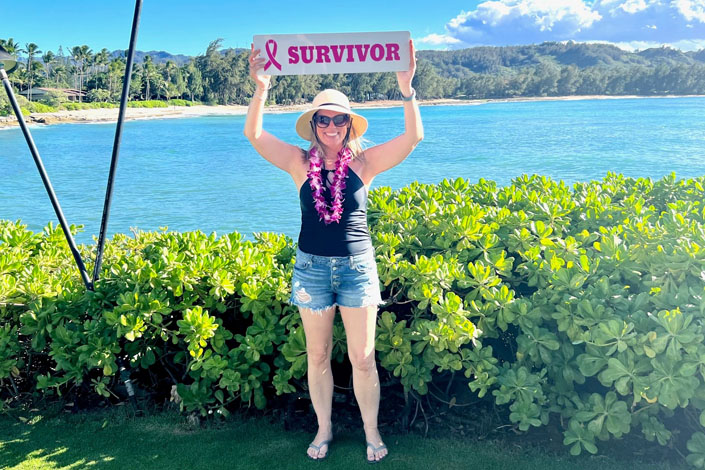
Share This:
Stay in the Know
Keep up with all the latest from UC San Diego. Subscribe to the newsletter today.





